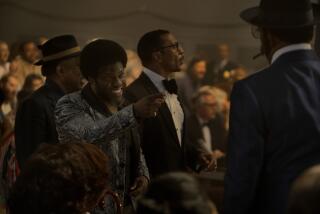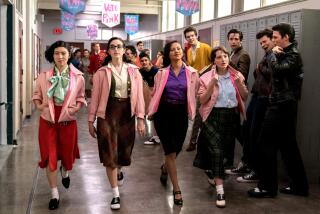TV Picks: ‘Brooklyn Castle,’ ‘Ali,’ ‘Paradise,’ ‘Enter Laughing’
- Share via
“Brooklyn Castle” (PBS, Monday). “I think that this is a good thing for kids to be exposed to,” coach Elizabeth Vicary says in Katie Dellamaggiore’s 2012 film about a fearsome and lovable inner-city middle-school chess team, “the idea that truth isn’t quite so simple as right and wrong and they’re studying on a level where the answers aren’t really clear to anybody -- or unclear to me, and I’m very good at it.” Getting a broadcast premiere this week as part of the PBS documentary series “P.O.V.,” “Brooklyn Castle” is funny and moving and full of vivid characters; a pitch for the importance of after-school programs; and, though a portrait primarily of the young players, a reminder that the aphorism that ends in “Those who can’t do, teach” is beans.
The chess-thletes of Intermediate School 318 are some of the best in the country: “Your opponents are exhausted, they’re tired,” a coach tells them at one meet. “When they see they have to play someone from 318, they don’t even want to show up.” There are plenty of triumphant moments here, not only in the meets to which the team travels but also in the context of academic tests and school elections; yet the film is also about learning how to lose, and to move on from losing to play again. The students are serious about the game, with an added adolescent, ear-budded sleepiness that contrasts with the speed of their play. Many are first-generation Americans, with parents working hard to give them a break; the film also takes us into their homes and reminds us that the variety of life is infinite, even around the poverty line, so often painted in a few sweeping strokes with a few dull colors.
FALL TV 2013: Watch the trailers
The kids include Rochelle, 13, who has a shot at becoming the first female African American chess master; Justus, an 11-year-old prodigy, traveling from the Bronx to Brooklyn in order to train at I.S. 318; Patrick, 11, using it as a way to handle ADHD (as “a fun way to build up your concentration”); Alexis, 12, quiet, feeling the weight of his future; and Pobo, 12, a big personality, team spirit and self-appointed “rock”: “By me encouraging my teammates,” he says, “I become a better human being.”
“Masterpiece: The Paradise” (PBS, Sunday). Based on the 1883 Emile Zola novel “Au Bonheur des Dames,” inspired by the Paris department store Le Bon Marche, this pleasingly soapy BBC series transfers the action (with some significant changes) to the north of England. As a sort of upstairs-downstairs story of the retail trade, it’s a cousin to the recent “Mr. Selfridge” (which it preceded onto the air), without the Barnum antics or the weight of historical characters to account for.
Emun Elliott plays John Moray, a self-made man of the future who has turned an old block of Victorian shops into a single gleaming white immensity of fancy goods. (Zola, and “The Paradise,” make the point that this is not an unalloyed good -- the old stores are withering in its shadow. Substitute Target or Amazon for the Paradise, and you have yourself a fitfully topical drama.) He is also, potentially, the metaphorical Archie to Elaine Cassidy’s wealthy, dark-haired Veronica and Joanna Vanderham’s blond Betty, a spunky country-bred shop girl. The whole retail enterprise here reeks with sex and seduction, if in a mostly genteel, 19th century way. “Isn’t the whole point of temptation to succumb,” Moray asks a customer in a crushed-velvet voice. “You make me love you,” Cassidy’s character tells him, “but you taunt me with it. I can’t breathe. Please help me. Loosen my dress, please.” Class is a subject here, as it must be in British period drama, but there is none of the affection or patience for the bumbling old rich that affects a show like “Downton Abbey.” Initiative is all in the new world: Vanderham’s shop girl looks upon her boss and says, “I don’t want to marry Moray, I want to be him.”
PHOTOS: Celebrities by The Times
“Muhammad Ali’s Greatest Fight” (HBO, Saturday). Stephen Frears directs this behind-the-bench legal drama about Muhammad Ali’s 1971 Supreme Court appeal of the 1967 ruling that denied him conscientious objector status and led to his being stripped of the heavyweight crown and to a state-by-state revocation of his boxing license. Easily imitated but fundamentally inimitable -- no offense, Will Smith -- Ali is seen here only through film clips, which provide a counterpart to the main action, which takes place all within the confines of the court. (These clips have their own narrative movement, taking the fighter from youthful braggadocio to seasoned thoughtfulness.) It’s an interesting chapter in American jurisprudence and politics, but perhaps the greatest value of Frears’ film is that it employs a Supreme Court worth of fine older actors -- there hasn’t been a picture with such aged star power since “Cocoon” (or “Cocoon: The Return,” I suppose). Frank Langella, as an imperious Chief Justice Warren Burger, a Nixon appointee portrayed as too much in his pocket, and Christopher Plummer as Justice John Harlan II, the voice of an independent judiciary, are the discoursing colleagues at the top of the cast list, with Fritz Weaver, Harris Yulin, Ed Begley Jr., Danny Glover and director Barry Levinson among the other justices.
The film has been criticized for being somewhat undercooked dramatically, and the use of the clerk played by Benjamin Walker is certainly feels gratuitous when it’s not actually annoying. (Although Harlan’s clerk did in fact provide materials that helped change his mind, and there is a nice counterpoising of the older justices and the younger clerks, gamboling in the halls and on the basketball court.) But given that docudramas tend to be dramatically overcooked in order to externalize themes and passions, I’m not sure that’s wholly a bad thing. Indeed, it’s when voices are raised the loudest that a scene seems the least likely. Recommended for the players, for historical interests and for the glimpses of Ali himself, a great man of his time, and still.
“Enter Laughing” (TCM, Wednesday/Thursday). Every month when the Turner Classic Movies program guide comes around, I look for one thing, and it’s this otherwise impossible-to-see 1967 comedy, directed by Carl Reiner and written by Reiner and Joseph Stein, from Stein’s play, itself based on Reiner’s autobiographical novel of late-Depression-era New York. I have praised it as hilarious to my much better half for many years; now I will see whether that is merely a fond folly of my youth. (The few available clips around suggest it is not.)
Reni Santoni plays the director’s rechristened younger self; entranced by movies and determined to act, he joins a pay-to-act fleabag theater company run by a grand and dipsomaniacal Jose Ferrer (playing a kind of broken-down version of his own legend). A brilliant Elaine May is Ferrer’s daughter, the troupe’s leading lady. Much goes wrong, you may have already devised. The estimable supporting cast includes Janet Margolin, Richard Deacon, Michael J. Pollard, Don Rickles and Shelley Winters. Jack Gilford plays Reiner’s boss, whose line (possibly not perfectly remembered), “It’s up to you if you want to do the hot-cha-cha” is something I’ve said often over the years, to myriad purposes; the line knows when it’s needed. (Young Rob Reiner is here too, in a small role.) The film airs on the West Coast at 1 a.m. Thursday, which Turner prefers to describe as Wednesday night.
More to Read
The complete guide to home viewing
Get Screen Gab for everything about the TV shows and streaming movies everyone’s talking about.
You may occasionally receive promotional content from the Los Angeles Times.







